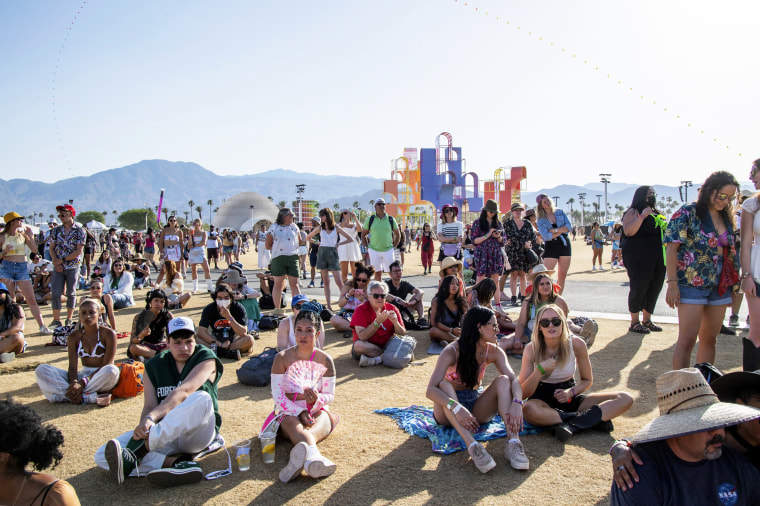Daily Covid cases in Riverside County, California, rose 76 percent in two weeks as tens of thousands of people gathered there for the Coachella Valley Music and Arts Festival over the last two weekends.
Though most Coachella events were outside, the festival did not require visitors to wear masks or present proof of vaccination or a recent negative Covid test.
"When you’re in close proximity to others singing and dancing and and eating and drinking — all the things that you do with these festivals — it’s not surprising that we’re going to see transmission," said Anne Rimoin, an epidemiology professor at UCLA Fielding School of Public Health.
Riverside County’s average daily Covid cases jumped from 102 on April 14, the day before the festival started, to 180 cases on Thursday, four days after it ended. But that figure is likely an undercount, disease experts said, because of the common use of at-home tests.
"What we're seeing is just the tip of the iceberg because we know that only a fraction of people who test positive are taking PCR tests or tests that are going to be reported," Rimoin said.
Most Coachella attendees also live outside the area, so their cases would be recorded elsewhere if they tested positive after leaving.
It may take at least another week for the full scope of infections to be recorded, Rimoin said. By then, another festival in the Coachella Valley will have come and gone: the Stagecoach Country Music Festival, which Friday to Sunday.
"We'll be dealing with the echoes of this for weeks to come," Rimoin said, adding, "We're destined to see many more cases as a result."
Omicron may have changed the risk of outdoor transmission
As of last week, the BA.2 omicron subvariant accounted for 89 percent of the coronavirus detected at the Palm Springs Wastewater Treatment Plant, near Coachella.
Although it's well understood by now that outdoor events are less risky than indoor ones, a large festival still increases the likelihood of an outbreak, especially now that BA.2 is dominant, experts said. Dr. Anthony Fauci, the White House’s chief medical adviser, has estimated that BA.2 is 50 percent more transmissible than the original omicron lineage. Omicron, in turn, was about three times more transmissible than the delta variant.
"We've looked at outdoor events in the past as being a little bit more protective than indoor events when it comes to the transmission of Covid-19, but I think that omicron really changed that calculation," said Cindy Prins, a clinical associate professor of epidemiology at the University of Florida.
"If you go to that kind of event, you have to expect that you could get exposed to Covid," she added.
People who spent lots of time under tents may have faced an increased risk of exposure, Rimoin said, since air circulation was partially restricted.
The two experts agreed that masking, testing or vaccination requirements could have lowered transmission to some extent.
"We could have all of these events safely without an increase in cases if we would employ the tools that we have available to us," Rimoin said.
Coachella did not immediately respond to a request for comment. The festival did offer Covid testing locations on-site, but Prins questioned whether that was enough, since it would be difficult for visitors who tested positive to isolate.
"How are you going to get home if you have to travel?" Prins said. "That is my concern: People get infected, they’re not going to skip their flight."

